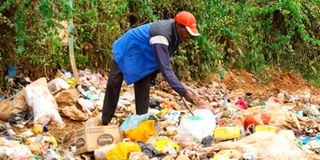Hope as county seeks to resolve garbage menace

A man rummages through refuse at a dumpsite in Kisii town in 2017. The town has been grappling with the garbage menace for years.
Huge mounds of stinking garbage welcome one to Nyambera, Kisii town.
Passers-by hold their noses in a futile attempt to ward off the pungent stench.
But at the nearby quarry, it’s business as usual. An army of workers pound stones into ballast for sale to builders. The activities go on even with warnings from environmental experts that the quarry is a hazard.
Boulders occasionally tumble down the cliff, endangering miners’ lives.
Fumes from burning of old tyres, which miners use to soften hard stones before breaking them up, also pose danger.
Kisii University researchers Evans Okemwa, Obed Mainya, John Lusweti and Peter Kinyanjui reveal in a study that there is high concentration of zinc, lead, copper and cadmium in the soils around Nyambera .
They also fear possible contamination of River Nyakomisaro, which snakes through the dumpsite down to Daraja Mbili market.
Heavy metals
Downstream, poor waste disposal from a company that used to make batteries years ago exacerbated the situation, according to the four researchers in a June 2020 article titled, “Assessment of the concentration of selected heavy metals in soils within the Nyambera dumpsite”, published in the International Journal of Scientific and Research Publications.
Heavy metals are part of the soil, but a high concentration of them is toxic. With Kisii experiencing a fast rise in population growth, urbanisation, industrialisation and advancements in agriculture, solid waste has increased significantly over time.
Due to lack of proper [and] well-structured waste management systems, the waste is disposed of at open dumpsites that lack formal control.
With time, metals are introduced into the soil and end up being leached, carried away by surface run-off, and introduced to crops by farmers who rely on the refuse from the dumpsite to plant their crops.
Finally, the metals end up in the human body when the food is consumed.
The ecosystem appears already destroyed, calling for early intervention before things get out of hand, says Mr Okemwa, the lead researcher.
“Solid waste poses a serious threat to life and it has the ability to pollute the terrestrial, aquatic and aerial environment,” the researchers add.
To remedy the situation, the Kisii County government has announced a plan that will see the solid waste at dumpsites turned into useful products such as organic fertilisers.
Other items like glass, paper, plastic and metals will be recycled if a deal is reached between the devolved unit and an investor.
The investor will be brought in by the Honorary Consul of Kenya in Greece, Ms Vicky Pantazopoulou.
Boon for the people
During a meeting two weeks ago with Ms Pantazopoulou at the county headquarters, Governor James Ongwae said he wanted to resolve the garbage problem before he leaves office next year.
Land Executive Walter Okibo told the Nation that the project will be a boon for the people.
“We’ve commenced talks, but we are yet to settle on the cost of the project” he said. “But be assured the solid waste down there will be transformed into useful items and I’m confident that soon, Kisii County will be producing organic fertilisers.”





